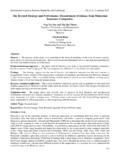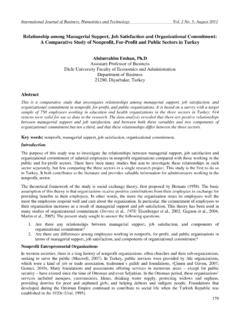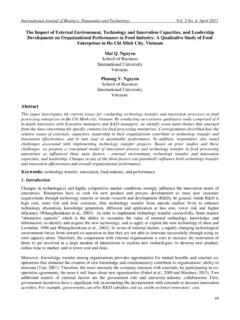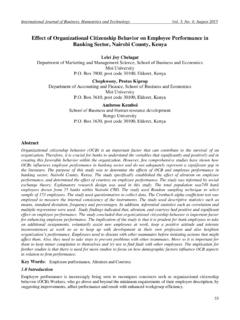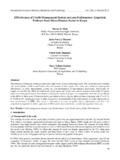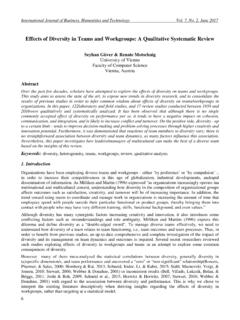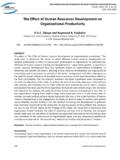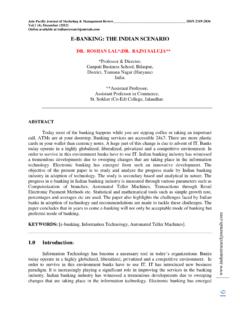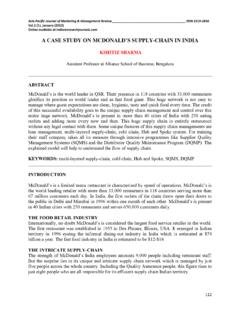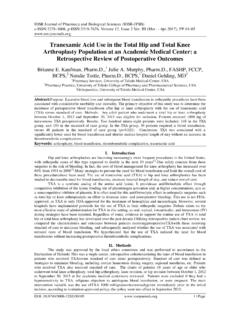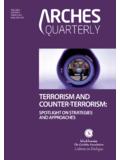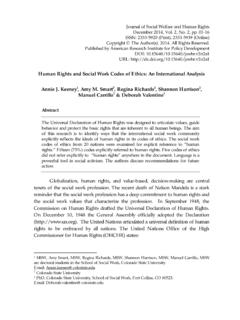Transcription of Military Interventions in the Nigerian Politics: ‘A Timed ...
1 International Journal of Business, Humanities and Technology Vol. 2 no . 5; August 2012 191 Military Interventions in the Nigerian politics : A Timed Bomb Waiting to Explode? The Avowal of a New Management Elites Olusoji George Department of Business Administration University of Lagos, Nigeria Seyi Shadare Department of Industrial Relations and Personnel Management University of Lagos, Nigeria Oluwakemi Owoyemi Department of Industrial Relations and Personnel Management University of Lagos, Nigeria Abstract Nigeria became an independent country in October 1st 1960 after about a century occupation by the British colonial masters. Unfortunately the Military struck in January 16 1966 and ruled the country for over 30 years.
2 Nigeria has therefore been governed for a longer period (over thirty years) of her independence by the Military . It is also interesting to note that the first colonial Governor General, Lord Lugard was a British soldier; he amalgamated the Lagos Colony, the Northern Protectorate and the Southern Protectorate together to become what his wife named Nigeria. The various controversial Military Interventions might be undesirable, but it was not unexpected; it might have done some harm, yet it recorded some successes. This paper aims at examining why the Interventions were expected and argue that it was not a total failure and disaster as most political and historical scholars had painted.
3 This paper relying mainly on secondary sources examines the remote and the immediate causes as well as the aftermath of the Military intervention. The paper concludes that the Military Interventions were not entirely wasted years , but created some new management elites who contributed a lot to the economic, social and political developments of the country. Keywords: Military , Nigeria and new management elites Introduction The name Nigeria was said to have been coined by the British colonialists to describe the vast land around the River Niger and its basin. It was then called Niger- area, after a long usage it was shortened to Nigeria (Yesufu, 1982). Mungo Park was exploring the River Niger when he stumbled into this vast area along the River.
4 Nigeria presently has a population of about 158, 2600 million people as at December 2010 ( , last assessed 16/07/21). The country is located on the extreme inner corner of the Gulf of Guinea on the West African coast. There are about 250 ethnic groups in Nigeria with the main ones being Hausa/ Fulani in the North, Ibos in the South East and the Yoruba s in the South West. About 4000 dialects are spoken in Nigeria. It occupies an area of 923,768 sq. km (356,669 sq mile), extending 1,127km (700mi) E-W and 1,046 km (650mi) N-S . The size of Nigeria is more than twice the size of California in the United States (Cohen. 1974).
5 Nigeria is the most populated country in Africa and the 10th most populous country in the Whole World, 1 out of every 4 black African is a Nigerian and 1 out of every 5 black people in the Whole World is a Nigerian . The population of Nigeria is more than that of France and Britain put together ( last assessed 16/07/12). The population is about double that of all the former French West African countries put together and about seven times as large as that of Ghana (Cohen, 1974). Centre for Promoting Ideas, USA 192 Oil is the flag ship of the country s economy; the proven crude oil reserve is about billon barrels in 2016 but will drop to billion barrels in 2021 ( , last assessed in 16/07/12) with a proven natural gas reserve of 5,210 billon barrels (Amaechi, 2006).
6 Nigeria is said to be an artificial creation: the handiwork of nineteenth and twentieth imperialism (Arikpo, 1957). This is because the inhabitants of the southern parts of the country are predominantly Christians, well educated and westernised in their thinking; this is because they had contact with the European traders for a couple of hundred years before their brothers and sisters in the North. The contacts with the colonial masters started around 1849; from this period there was no stopping until the whole country was finally colonised (Yesufu, 1982). The traders could be said to have been the fore runners of the British Government. This was more so as the first trip of Mungo Park was sponsored by private initiatives but as soon as his report was made public the British Government took over since there were now enough economic reasons to be involved in the Niger River areas (Park, 1799).
7 On the other hand, the inhabitants of the Northern parts are Moslems and very conservative because they were influenced by the jihad war of Uthman Dan Fodio (Yesufu, 1982). Nigeria is also an artificial State because it was created according to colonial exigencies rather than ethnic coherence. There are three main nationalities: the mostly Christian Yoruba s in the South West, the predominantly Christians Ibos in the South East and the Muslim Hausa Fulani s in the North. Between these three main nationalities they constitute 65% of the population while the remaining 35% are the minorities (Butts and Metz, 1996). Lord Lugard with the expansionist agenda for the benefits of the British and British economy brought these two strange bed fellows together through the Amalgamation of Nigeria Act of 1914 (Nicolson, 1969).
8 These sets of people do not have anything in common, the southerners were and still are modernists while the Northerners were and still are conservatives and extremists. From this period, the British increased their activities in the Niger River area, which eventually led to the political, economic, judicial and Military rights that were vested in the Royal Niger Company in 1885 all through to 1900. In 1900, the Protectorate of Northern and the Protectorate of Southern Nigeria were proclaimed with two distinct administrations, the Colony of Lagos was then under another administration (Ibid, 1969).. In 1906, the Colony of Lagos and the Southern Nigeria Protectorate became one administration; in 1914 the Amalgamation Act brought the Northern and Southern Protectorate together under one administration to be known as the Colony and Protectorate of Nigeria.
9 It should be stated that from 1922 a small portion of the former German Cameroons was administered as part of the entity called Nigeria. It was first administered as a Mandated territory and later after the Second World War it changed to a Trust Territory . (Yesufu, 1982) The Cabinet or Ministerial system of Government was adopted and enshrined into the 1951 Constitution. In 1954 a Federation was proclaimed and the country started to be known as the Federal Republic of Nigeria. The country was divided into three Regions Northern, Western and Eastern Regions apart from the Cameroon. Lagos was the capital of the Federation and administered separately through the Minster for Lagos affairs. In 1960, Nigeria became independent, and in 1961 the Southern and Northern Cameroons through a referendum voted for their independent and through unification with the Cameroun Republic became one country.
10 It should be stated that since Nigeria s independent in 1960 the Southern and the Northern Cameroons were not administered with Nigeria. In 1963, Midwestern region was carved out of the Western Region. It included the Benin and delta Provinces. The intervention of Military in the political scene of Nigeria was not totally a surprise to most political observers and thinkers ; this was because nearly all the pre-colonial ethnic groups in the country were ruled by traditional rulers who were more or less dictators (Yesufu, 1982). For example the Oba s of the South West of Nigeria, the Emir s of the Northern Nigeria and the Obi s of the South Eastern Nigeria were monarchical dictators who were never democratically elected (Nordlinger, 1977; Janowitz and vanDoorn, 1972; Feit, 1968).
